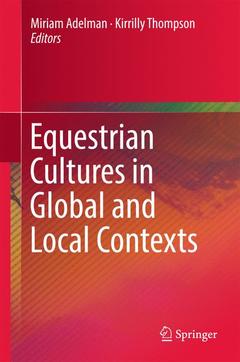Equestrian Cultures in Global and Local Contexts, Softcover reprint of the original 1st ed. 2017
Coordonnateurs : Adelman Miriam, Thompson Kirrilly

This edited volume demonstrates the broader socio-cultural context for individual human-horse relations and equestrian practices by documenting the international value of equines; socially, culturally, as subjects of academic study and as drivers of public policy. It broadens our understanding of the importance of horses to humans by providing case studies from an unprecedented diversity of cultures. The volume is grounded in the contention that the changing status of equines reveals - and moves us to reflect on - important material and symbolic societal transformations ushered in by (post)modernity which affect local and global contexts alike.
Through a detailed consideration of the social relations and cultural dimensions of equestrian practices across several continents, this volume provides readers with an understanding of the ways in which interactions with horses provide global connectivity with localized identities, and vice versa. It further discusses new frontiersin the research on and practice of equestrianism, framed against global megatrends and local micro-trends.Dr. Miriam Adelman is a Professor of Sociology and teaches in the Graduate Programs in Sociology and Literary Studies at the Federal University of Paraná (UFPR), Curitiba, Brazil. She has been involved in sociological research on the Brazilian equestrian world since 1995, focusing largely but not exclusively on gender issues therein. She is co-editor of an earlier Springer volume on equestrian practice, Riding around the World: Gender in Equestrian Sport (Adelman and Knijnik, eds., 2013). A longtime fan of the American Quarter Horse, she has recently shifted her favors, in light of new encounters with the southern Brazilian Cavalo Crioulo.
Dr. Kirrilly Thompson is an Associate Professor at Central Queensland University’s Appleton Institute. She has conducted ethnographic research on human-horse relations and equestrian cultures since 2000. With interests in animal attachment, risk perception, and behavior change, Kirrilly has researched mounted bullfighting in Spain, showjumping in Europe and Eventing in Australia. In 2015, Kirrilly was one of ABC Radio National’s Top 5 Science Communicators Under 40. She lives in the locale of South Australia where she practices the global sport of dressage on a mare created from frozen semen imported from Germany.Drs. Adelman and Thompson collaborated previously on the book ‘Gender and Equestrian Sport: Riding Around the World’ (2013).
Date de parution : 06-2017
Ouvrage de 278 p.
15.5x23.5 cm
Date de parution : 05-2018
Ouvrage de 278 p.
15.5x23.5 cm
Thèmes d’Equestrian Cultures in Global and Local Contexts :
Mots-clés :
Horses and Human Cultures and Civilizations; Equines across Cultures; Equestrian Cultures and Identities; Equestrianism and Work; Gender and Equestrian Activities; Global Equestrian Trends; New Equine Industry; Chinese Leisure Horse Industry; Stable workers in Brazil; Socio-cultural changes in Equestrian Sport; Equestrianism as Heritage Tourism in Morocco; Horsemanship in Poland; Equestrian Leisure in France; Spanish Horse in Leisure Horse Trade; New Equine Industry in Finland


